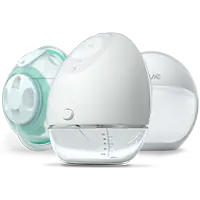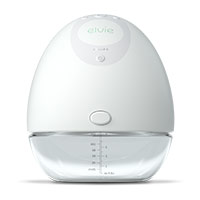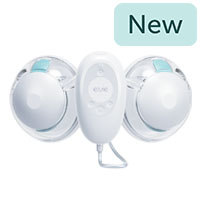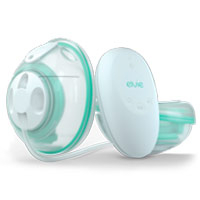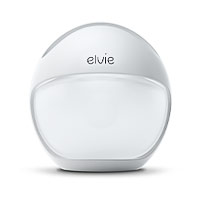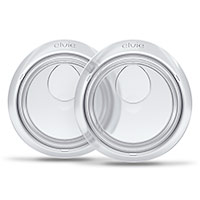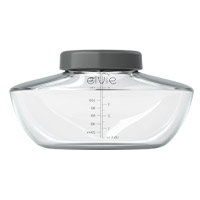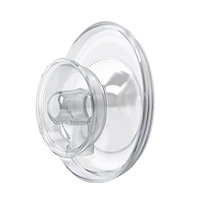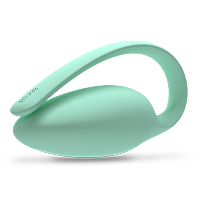You just discovered you were expecting? Great news! You gave birth recently? Congratulations! Among all the questions about pregnancy and having a baby, you probably ask yourself: do I want to breastfeed? Should I? This choice belongs to you, but at Elvie, we are here to give you some info and expert advice about breastfeeding and the benefits it can have for you and your baby.
Take a quick look at breastfeeding history
Breastfeeding. The first natural way to feed children used by many women. Due to the fact that some women couldn’t breastfeed or didn’t want to, wet nursing - a woman nursing someone else’s baby or using animal milk - was very common before the appearance of formula, created by a chemist named Justus von Liebig at the end of the 19th century. Better healthcare knowledge and breastfeeding being more promoted led to an increasing number of women breastfeeding in the 1980s until the 2000s. Even if today, more and more women breastfeed, some still hesitate to do so or some stop their breastfeeding journey after a few months. While 81% of the mothers in the UK breastfeed at least once, only 34% keep breastfeeding when their baby is six months old and only 0.5% keep doing so after 12 months according to the BBC (2016). A study by The U.S. Department of Health and Human Services brought several reasons for women not breastfeeding such as a lack of knowledge about its benefits and social expectations about bottle feeding. This is more common in the US where evidence of poor social and family support combined with the influence of others’ opinions may have stunted the growth of breastfeeding. Also, the difficulty to go back to work and still breastfeed when workplaces are not adapted can be an obstacle for many women. A survey commissioned by Public Health England, with 500 mums showed that 74% of them were afraid that breastfeeding could cause pain, 71% that it could prevent them from taking medication and 63% of them were afraid of feeling embarrassed to breastfeed in front of other people. More than half of the surveyed moms worry that they wouldn’t know if their baby gets the right quantity of milk and more 30% of them are concerned that their baby might not get the nutrients they need.
Discover how lactation works
We know that breastfeeding can be difficult and producing milk varies from one woman to another. You could breastfeed for three, six months or a year or might also want to combine bottle feeding and breastfeeding. Or you may find yourself unable to breastfeed. Milk flow varies from a woman to another as much as one child to another.
First thing to know is that your breasts start to change way before birth. Actually, according to Beth Graham, it starts when you conceive. So that immediately after birth your breasts can produce a thick and gold milk, called colostrum, also known as the “early milk”. Containing antibodies, proteins (including bovine beta-casein, alpha-lactalbumin and immunoglobulin IgA) and carbohydrates, the colostrum “ is super concentrated because your baby will only drink very small amounts – the baby’s stomach is only the size of a marble or Malteser. [...] ” says Beth Graham. It helps your baby to get all the nutrients they need in very small quantities. Then “your breast milk volume will then steadily increase until your baby is about 6 weeks old and you then produce the same volume of milk until you choose to decrease the amount of breast milk you give your baby by supplementing. ”
I hear the question coming: what about my breasts? Are they going to change? Yes, a little bit. Your entire body will change. Your breasts might get larger and heavier to breastfeed your baby and change a bit of shape since the skin is stretched during breastfeeding. But firstly, they won’t be misshaped or damaged and secondly, they will return to almost their previous size after you stop breastfeeding since the milk-producing tissue will be replaced by the fatty tissue.
Beth shares with us her breastfeeding tips on taking care of your breasts. After birth, your body will produce colostrum and “after 3-4 days your milk will then increase in volume and people often call this your 'milk coming in'. Your breasts will feel really full for 2-3 days as the breasts adjust to making all this milk. After a few days, the breast tissue softens and it becomes more comfortable for you while still producing plenty of milk. This fullness is called engorgement and it's really important to feed the baby or pump milk regularly during this time to help your breasts become softer every few hours (when the baby feeds). Leaving the breast hard for extended periods of time may result in a decrease in the supply going forward or in extreme cases, the fullness may cause problems like blocked ducts, very sore areas where the milk is trapped in the breast tissue and not being drained well, and mastitis that is an infection of the breast tissue resulting in extreme flu-like symptoms for you and needs antibiotic treatment to get rid of it.”
Get the most out of breastfeeding your baby
Nowadays, public health organizations strongly advocate for breastfeeding. Why? Simply because it is a natural way to prevent you and your baby from health problems since it contains antibodies, protective enzymes, nutrients, and vitamins. Beth Graham tells us that “the antibodies protect the baby from infections such as tummy bugs, diarrhea, colds, chest and ear infections, and the babies are less likely to develop childhood leukemia, diabetes or become overweight”. The Natural Resources Defense Council states that the risk to develop childhood diabetes is reduced by 20 to 30% for babies that have been breastfed during their three first months. The NHS also asserts that breastfeeding prevent the baby to get Sudden Infant Death Syndrom (SIDS), the risk is reduced by more than a third according to the American Academy of Pediatrics. Surprisingly it will also prevent your baby from developing an allergy to cow’s milk and help your baby’s mental development because of the bond developed during breastfeeding.
Your body also adapts to your baby and its needs. Your breast produces more milk according to your baby’s appetite and to the time of the day. Produced during the night, your milk contains more melatonin than during the day. This hormone regulates sleep cycles but it is only produced by adults and not infants. Through your milk, this hormone encourages your baby to sleep. Plus, breast milk is composed of elements that will evolve following the baby’s growth and its needs. When your baby is sick, the antibodies protect the baby from their mom’s sickness as well as giving the baby more antibodies that target illness and helping them to recover faster. You read that right! The colostrum is especially abundant in antibodies. It means that babies will have a longer and stronger immunity if they’re breastfed. In 2006, The Journal of the American Osteopathic Association published an article showing that breastfed babies during their three first months had fewer ear infections and suffered less from diarrhea (2006). Of course, it’s not and shouldn’t be the only way to immunize your baby but it’s a good start! And it doesn’t stop here. Breastfeeding your baby now will also help to reduce the risk of high blood pressure, cardiovascular disease and even obesity as an adult. According to the American Academy of Pediatrics, breastfeeding your baby enables to reduce adolescent and adult obesity by 15 to 30%. Crazy, right?
But wait, there are also benefits for the moms who breastfeed! Breastfeeding reduces the risk “of breast and ovarian cancer and of osteoporosis (a disease that makes your bones more fragile and more likely to break), diabetes and cardiovascular disease and it helps you reduce your chance of obesity” explains Beth Graham. Plus it helps your uterus to go back to the size it had before the pregnancy thanks to the oxytocin hormone. It also helps your body stop bleeding much faster postnatally. It also helps you to relax and bond with your baby, something that’s quite enjoyable!
Learn more about breastfeeding with our Elvie Pump here and how to take care of your breasts here.

